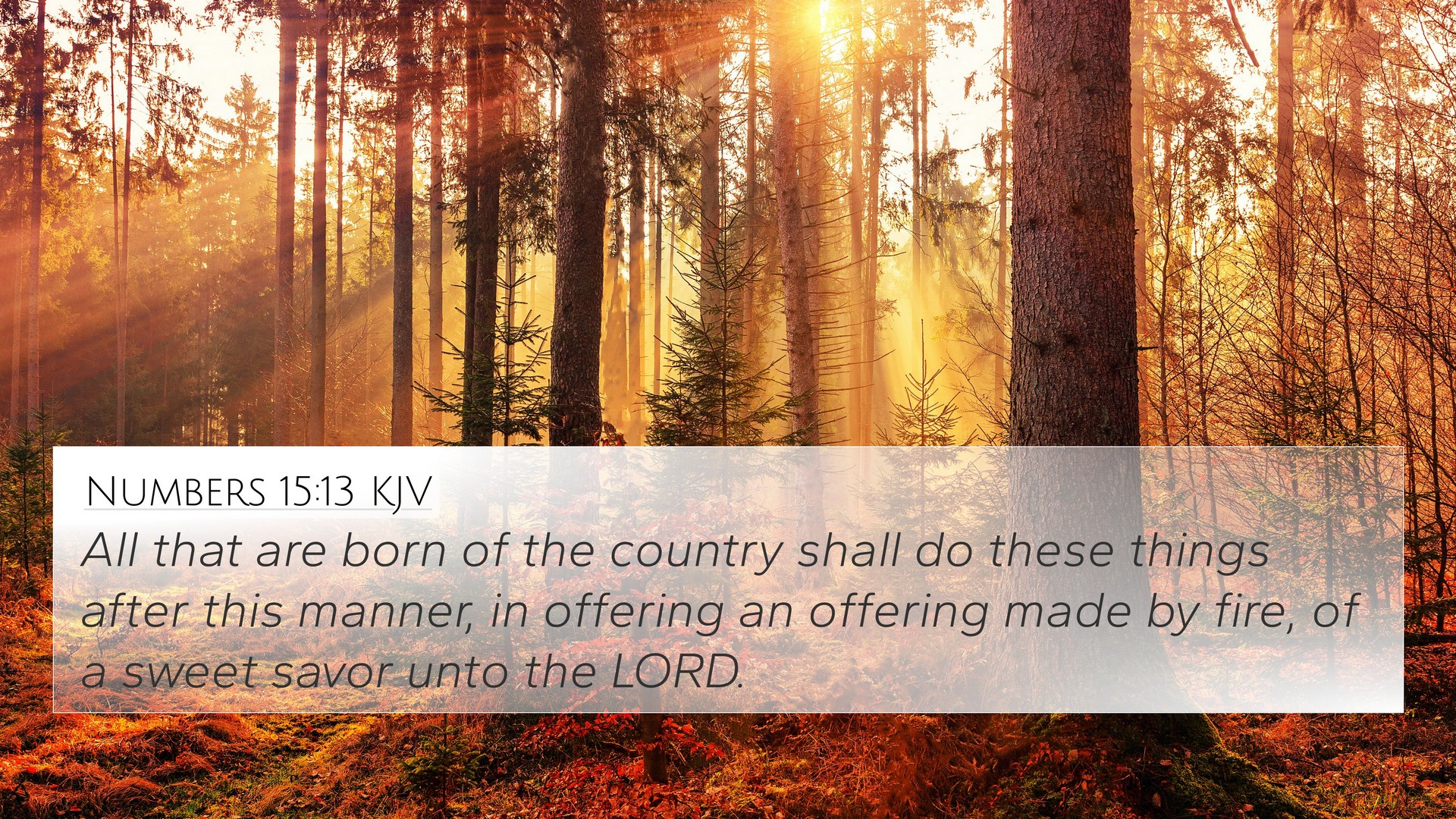Understanding Numbers 15:13
Verse Summary: Numbers 15:13 states, "Every native-born Israelite shall do these things in this way, in presenting a food offering as an aroma pleasing to the LORD." This verse emphasizes the importance of the Israelites' offerings to God, highlighting both a communal and individual responsibility in worship and obedience to God's commandments.
Contextual Background
The Book of Numbers is a pivotal section of the Torah, detailing the journey of the Israelites in the wilderness and their time in the desert before entering the Promised Land. Chapter 15 outlines specific laws regarding offerings, which serve to maintain the Israelites' connection with God through their worship.
Commentary Insights
- Matthew Henry: He notes that this verse indicates God’s expectation of individual participation in worship through offerings. Henry stresses that these offerings should be presented with the right heart posture, as a pleasing aroma signifies acceptance.
- Albert Barnes: Barnes comments on the significance of the term "native-born," suggesting that this indicates a special relationship between the Israelites and God. He indicates that the offerings symbolize a commitment and devotion to their covenant with God.
- Adam Clarke: Clarke emphasizes the procedural aspect of the offerings and their spiritual importance. He highlights that this practice foreshadows the ultimate offering of Christ, who fulfills the law and represents the ultimate pleasing aroma to God.
Thematic Connections
This verse provides a thematic connection to many other biblical texts regarding sacrifice and worship:
- Exodus 29:18: Discusses the burnt offerings as a pleasing aroma to the Lord.
- Leviticus 1:9: Highlights the concept of presenting offerings to God and the purity expected in the offering.
- Philippians 4:18: Paul speaks of his ministry being a sweet-smelling sacrifice acceptable to God.
- Ephesians 5:2: Describes Christ’s offering as fragrant and exemplary of love.
- Hebrews 13:15: Encourages believers to offer praise as continuous sacrifices to God.
- Romans 12:1: Calls Christians to present their bodies as living sacrifices, holy and pleasing to God.
- Psalm 51:17: God desires a broken spirit and contrite heart more than external offerings.
Connecting Threads
Numbers 15:13 establishes the foundation for understanding the significance of sacrificial rites throughout the Bible, creating a web of connections between various texts. This interplay between verses signifies how the Old and New Testaments echo the themes of sacrifice and worship, leading to a deeper understanding of God’s desires for His people.
Tools for Cross-Referencing
To further explore these connections, the following tools can aid in a structured study:
- Bible concordance for locating specific verses and their cross-references.
- Cross-reference Bible study guides that outline relationships between texts.
- Comprehensive Bible cross-reference materials enhancing the learning experience.
Practical Application
Understanding Numbers 15:13 encourages modern readers to reflect on their personal sacrifices and worship practices. It prompts questions such as:
- How do I ensure my offerings to God are pleasing?
- What does it mean to me to present myself as a living sacrifice?
- In what ways can I incorporate biblical principles of worship in my life today?
Conclusion
Numbers 15:13 serves as a reminder of the commitment and obedience that God desires from His people, encouraging both individual responsibility and collective worship. The interplay of themes and connections within the Bible reinforces a comprehensive understanding of God’s expectations and the significance of sacrifice.


